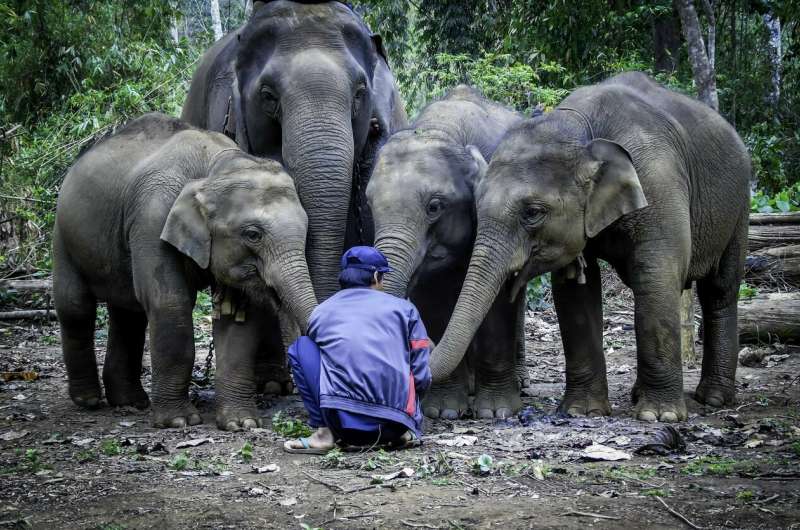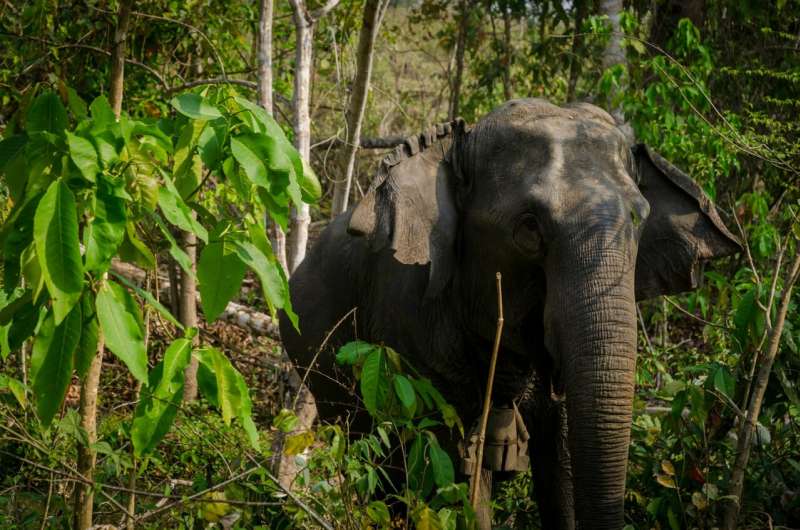Modern mahouts taking care of elephants in Myanmar are younger and less experienced

Traditional elephant handling worldwide is rapidly changing. Researchers from the University of Turku in Finland and Myanma Timber Enterprise (MTE) veterinarians found mahouts in Myanmar are only 22 years old on average, with an average experience of three years working with elephants, and they are changing elephants yearly preventing the development of long-term bonds between elephants and mahouts. These shifts contrast the traditional elephant-keeping system of skills being accumulated over a lifetime of working with the same elephant before being taught to the younger generation.
Asian elephants are endangered, but remarkably, around one third of the remaining 45,000 Asian elephants in the world live in semi-captive conditions, cared for by handlers known as mahouts. Expert knowledge of mahouts accumulated over many generations is of great importance in handling these giant, essentially wild animals.
However, this knowledge transfer is now threatened: recent societal changes in countries across Asia have affected the traditional mahout system. Myanmar, with the largest semi-captive elephant population of 5,000, has been thought to be one of the last strong-holds of traditional mahouts and their expert knowledge. Researchers from the University of Turku, Finland, together with MTE veterinarians investigated how recent political shifts in Myanmar coupled with increased urbanisation and improved access to technologies may have impacted the traditional mahout profession.
The researchers interviewed experts with long-term careers working within elephant-keeping in Myanmar, as well as over 200 current mahouts employed in the logging industry. The study discovered profound changes within the mahout system in Myanmar that may affect elephant welfare and warrant further research. Mahouts today are younger, less experienced and spend less time in the job than in the past. The study also found a reduced traditional family connection to the profession.

"Although almost half of the mahouts we interviewed had a family member also working with elephants, it seems that this link could decline further in the future, with few mahouts wishing their children to follow in their footsteps, especially the younger generation," says Doctoral Candidate Jennie Crawley, lead author of the study.
"It is really important to conduct further research to understand how these changes may impact the welfare of elephants, as frequently changing mahouts with little experience in the profession may increase animal stress and risk of injuries. Our findings already allow managers to take steps to ensure there are no negative impacts for the elephants or for the mahouts working with these huge animals," adds Academy Professor in Ecology Virpi Lummaa, the senior scientist involved in the study.
Monitoring implications for the mahouts is particularly important: less than 20% of current mahouts had spent any time as an apprentice before being paired with an elephant, contrasting past tradition and recommendations of a 2-year apprenticeship learning period.
One important finding was that despite these changes, a significant majority of experts thought that elephant treatment is better now than in the past, often attributing these improvements to "more techniques and training" reflecting well on current elephant care in Myanmar. The research team hopes future studies can shed light on which parts of the country are affected most, and where mahout training and support is most needed to improve the co-living of both elephants and their dedicated caretakers.
More information: Jennie A. H. Crawley et al. Investigating changes within the handling system of the largest semi-captive population of Asian elephants, PLOS ONE (2019). DOI: 10.1371/journal.pone.0209701
Journal information: PLoS ONE
Provided by University of Turku



















